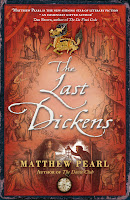Title: The Last Dickens
Author: Matthew Pearl
ISBN: 3 2300 01461423 0
Published: Random House Group Limited (Harvill Secker)
Date: 2009
(Book quote)
Dickens laughed at his hesitation. “Oh, you may well tell the truth, Mr. Branagan! One more blasted ‘Dickensite’ and I may tip over from the weight. Nothing terrifies a writer like meeting his reader for the first time.”
_______
Alas, something seems to have happened to Matthew Pearl in between The Dante Club and The Last Dickens… and no, I haven’t read The Poe Shadow yet so maybe that was it. While his first novel was bursting with impassioned energy, this third one has more than a little of world-weariness to it. The love of words and tapestry has faded, and instead there is a plod-plod of pandering to popular taste, a rather bloodless hacking-out of a story. Perhaps the most depressing thing about it is that on my copy’s cover, there’s an endorsement of the book by that abomination currently smeared over the fair face of the written word (I won’t call it literature), Dan Brown. Dan Brown! He has about as much right to give weight to a fine writer like Pearl as a rooting sow has to give lessons to the Queen in etiquette – but endorse he does, as it helps sell books. To have submitted to this, Pearl must be willing to do anything.
The very subject of the book seems to echo the depression and subjugation the writer appears to be toiling under. If focuses around Dickens’s final (unfinished) novel Edwin Drood. Chief protagonists include Dickens himself (mainly on his American reading tours) and his entourage, James Osgood the Boston publisher (previously appearing in The Dante Club) and his bookkeeper Rebecca Sands. Also featuring members of Dickens’s family including Dickens’s son Frank (at the time in India) and daughter Mamie, Tom Branagan (Dickens’s assiduous porter), the ambiguous ‘madman’ who visits Dickens at his house Gadshill ‘Dick Datchery’, Marcus Wakefield the tea merchant and the Zoroastrian pirate-turned-hitman ‘Herman’. The main motivation for all movements within the book are either monetary gain, or narcotic oblivion. Ok so there’s a bit of altruism, a bit of interest in literature, even count a bit of fame-mongering as a positive force. But mainly, the characters are trying to latch onto the wealth-bringing powers of Dickens and his words like lampreys stuck to a fish. It’s depressing.
The novel starts when Rebecca’s brother Daniel (who also works for Osgood’s publishing company) is mowed down in a streetcar accident, which upon further inspection appears to be opium-induced. Like the plot of Edwin Drood, The Last Dickens circles round the vortex of struggles surrounding this narcotic. After the death of Dickens in the midst of Drood’s serialisation, Osgood travels with Rebecca as an amanuensis to England to attempt a detective-recovery of any fragments of the sequels left in existence. He beavers busily through what is left of the Dickens household (now being torn apart for auction to keep the large family in cash), trawls through opium dens, meets the originals of a few characters from Drood, gets beaten up, threatened, enticed, disillusioned, goes back to Boston only to find further clues there. Meanwhile there’s a romance (in the colloquial phrase) blossoming on the side, he’s growing up a bit, more layers of the mystery onion are peeled back and deception upon carefully planned deception revealed, but does one care? Yawn.
It’s heartbreaking to say this as it’s all so carefully plotted out and beautifully written but there’s no way out, it’s simply soulless. Falls foul of one of the most cardinal sins in writing: one doesn’t care about the characters. Dickens is portrayed as quite a noble character but unfortunately the knowledge that is real life he was pretty despicable makes it all a bit hollow. His crew and family are mainly detestable with few redeeming features. Osgood and Rebecca – although they’re both theoretically respectable and amiable as well as being believably rounded – are simply dull. If you met them at a dinner table and chatted to them for half an hour you’d move on and be glad of it. The villains are slightly memorable, but not fleshed out throughout the novel enough to give them weight. (For two of the three main villains, we get a stolid passage where their past lives are described, later on in the narrative. It’s not good enough). The one flash of liveliness perhaps lies with the ‘Bookaneers’, the strange pantomime-like characters who make a living stealing texts – marginal characters to say the least. To reflect that the glimmer of literary piracy is the most inspiring thing to Pearl throughout this novel clicks the lid on the piece’s coffin with a finality that’s a little grim.
Two final peves, as a gardener and a writer. Firstly, the opium poppy, papaver somniferum, is a beautiful plant. Not a soul could call it otherwise. However, grown in the British climate it is entirely unable to produce the narcotic sap for which it is famed, and is purely decorative. Not only is it highly unlikely that it would already be grown as a garden plant in Britain at the time of the setting, but the notion that an addict struggling to be free of the clutches of opium would leave an offering of one of the blooms on the tomb of an author he respected is preposterous and downright sloppy on multiple levels. Secondly, have you ever tried writing with a quill? It is not possible to write a novel (even in shorthand) with a single quill, let alone without sharpening it once. Compared to modern writing implements these are extremely short-lived items, and in need of constant upkeep. For such a major plot-twist to hang on such an obviously implausible thread is straining credulity much too far. I would have expected better.
Wednesday, August 18, 2010
Subscribe to:
Post Comments (Atom)

No comments:
Post a Comment